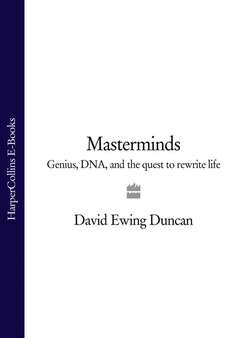Читать книгу Masterminds: Genius, DNA, and the Quest to Rewrite Life - David Duncan Ewing - Страница 13
5
ОглавлениеMelton presented the chimeras and clones as intellectual “puzzles” and has no plans to implement these notions. He makes it clear that he has no interest in experimenting on humans. Yet he would not be opposed to the chimera experiments if they were considered ethical and were allowed.
I wonder whether monkeys with human brains will one day seem as normal as heart surgery does today, or whether cloning will ever actually be preferred to “natural” childbirth. Melton’s obsession with “normal, normal, normal” is an intriguing one, because normality does keep shifting with new scientific advances and has since at least the day that Prometheus gave us fire—which must have radically shifted what was “normal” those many millennia ago. Also driving the issue of what is normal is Sam and Emma, whose father wants what any parent craves—to save his children from suffering. Yet as Bill Hurlbut of Stanford asks, How far do we want to go down the slippery slope? Or, as George Whitesides has said, Is there a possible scientific path that scientists could go down, but shouldn’t—when they should just say no? When one of the gifts offered by Prometheus is simply too dangerous, or too abnormal, as Melton would say?
In this sense, Doug Melton is simply another figure in an ancient question of whose normality is really normal with new science and technology, and whose is not. Ethics aside, I have to admit to a certain curiosity about what Melton would get in his human-monkey chimera. Perhaps the beginnings of a superrace of primates unimagined even by Michael Crichton, or a few poor horrific wretches that would be true Frankenstein creatures, wandering the Earth seeking revenge against their creators.
Later, on the phone, I ask Melton again whether he sees any dangers in stem cells, and chimeras, and the like. Is there a time when he would ever say no or halt an experiment?
“I don’t know what will come of this,” he says. “On the other hand, I think it’s uninteresting to live in a society where one is so afraid of the unknown that you won’t try new things. I’ll think about the dangers, because I haven’t thought about them enough. I should think about why one shouldn’t do that experiment.”
*In various twin studies, twins separated at birth or early in life manifested differences in how they acquired diseases and traits despite having identical DNA, suggesting that both environment and genes determine outcomes.
